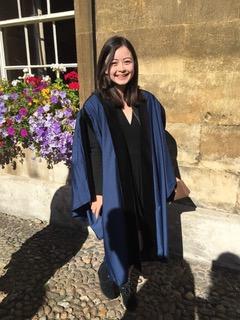Studying in Quarantine

Studying in Quarantine
'Usually, when I’m leaving Cambridge at the end of term, I’m looking forward to a solid 15 hours of sleep and a few weeks away from the constant go-go-go of Cambridge life. But instead, the last few days of this Lent Term were filled with a sense of unease, a nagging “what if” feeling. While I had assumed, naïvely in hindsight, that my life would go on as normal despite the growing warnings about Covid-19, within a week this was upended as I booked a last-minute flight home to Switzerland while my friends frantically texted me about potential border-closures, all while I tried to pack as much as I could into one suitcase.
To abruptly realize you have six months of essentially blank time is a strange and somewhat disturbing realization', writes Olivia Bisbee, Gonville & Caius College.
I relish the structure and direction provided by our packed terms, the certainty of knowing what needs to get done and when, despite the accompanying exhaustion this can bring. Our Easter Term would usually be one of the busiest, as we prepare for five exams and look forward to May Week events. However, this was all disrupted, and instead I found myself preparing for just one online exam and a portfolio of two supervision essays.
Initially I was excited to have the extra time to work on my dissertation and summer projects, but quickly realized that this too would be different than I planned. I had hoped that the experience of conducting archival research for my dissertation would be a formative one, my first experience of ‘real’ historical work outside of the classroom. However, my vision of sifting through boxes of old documents in a dimly lit archival reading room at the Palais de Nations in Geneva has instead become one of me in my pajamas at my desk, trying to decode unorganized, half-completed online League of Nations archival material, desperately hoping that the documents I need have been digitized.
Indeed, all aspects of my work, whether it was revising for exams, researching a dissertation, or completing pre-reading for next year’s papers have become significantly more challenging when online books became the only option. This has the upside of forcing me to become more creative and flexible in making do with what’s accessible, but not being able to access the physical locations and materials that normally underpin my studies makes the work feel less exciting, even somewhat less meaningful. This isn’t to say that studying remotely is all bad: the individual nature of the work is unchanged, and supervisions and study habits have become more flexible, leaving time for extracurricular projects like society Committees or language classes. While in my case, the traditional archives and resources I intended to use were easily accessible, for others working online expands their options and allow them to research topics that previously would have required significant time, travel, or cost. Perhaps we will need to get used to working with more online resources, and to embrace them more than we currently do in our usual Cambridge work.
When, or perhaps if, we return to Cambridge in Michaelmas, things will certainly be different. We’ll have learned to be more flexible, and this will be central to the process of adjusting to a new style of learning and teaching. We might be more cautious too, more aware that things can and might change rapidly. While these changes are daunting, they provide an opportunity to expand beyond my comfort zone, to rely more on my ability to adapt than my ability to plan, and I intend to make the most of this.
